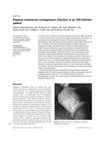 60 citations,
September 2013 in “Alimentary Pharmacology & Therapeutics”
60 citations,
September 2013 in “Alimentary Pharmacology & Therapeutics” Immunosuppressive and anti-TNF therapies in IBD patients can increase the risk of skin cancer and cause various skin issues.

Higher TGF-β signaling may increase skin cancer risk in organ transplant recipients.
 March 2024 in “Cirugía y Cirujanos (English Edition)”
March 2024 in “Cirugía y Cirujanos (English Edition)” Kidney transplant patients often have skin issues, mainly infections.
40 citations,
September 2019 in “World journal of clinical cases” An elderly man's hair grew back after a treatment that transferred healthy gut bacteria.
 26 citations,
March 2014 in “Rheumatology”
26 citations,
March 2014 in “Rheumatology” Some drugs used to treat inflammation may cause hair loss.
 1 citations,
March 2019 in “Actas Dermo-Sifiliográficas”
1 citations,
March 2019 in “Actas Dermo-Sifiliográficas” New cancer treatments are less harmful to hair but can still cause hair loss, color, shape, and growth changes.
 1 citations,
April 2018 in “Revista da Sociedade Portuguesa de Dermatologia e Venereologia”
1 citations,
April 2018 in “Revista da Sociedade Portuguesa de Dermatologia e Venereologia” Hidradenitis suppurativa is a chronic skin condition more common in women, linked to genetics and lifestyle factors, and associated with various other health issues.
 7 citations,
March 2021 in “Biology”
7 citations,
March 2021 in “Biology” Scaffold improves hair growth potential.
 2 citations,
March 2021 in “Cutis”
2 citations,
March 2021 in “Cutis” Some breast cancer treatments, like taxanes, can cause long-term hair loss.
 57 citations,
March 2018 in “International Journal of Molecular Sciences”
57 citations,
March 2018 in “International Journal of Molecular Sciences” The extracellular matrix is crucial for controlling skin stem cell behavior and health.
99 citations,
September 2007 in “The American journal of pathology” Chemotherapy damages hair follicles, causing hair loss and other cellular changes.
 275 citations,
March 1999 in “Journal of The American Academy of Dermatology”
275 citations,
March 1999 in “Journal of The American Academy of Dermatology” Chemotherapy can cause various skin reactions, with hair loss being the most common, and proper diagnosis and treatment of these reactions are important.

Non-adherence to medication in Egyptian SLE patients leads to more hospitalizations and symptoms.
 81 citations,
March 2009 in “Seminars in Cutaneous Medicine and Surgery”
81 citations,
March 2009 in “Seminars in Cutaneous Medicine and Surgery” Effective hair loss treatment in women requires correct diagnosis and can include medications like minoxidil, antiandrogens, and treatments for underlying conditions like PCOS.
 11 citations,
May 1998 in “International Journal of Dermatology”
11 citations,
May 1998 in “International Journal of Dermatology” Using a blow dryer in a certain way can cause localized hair damage with bubble formation inside the hair.
 March 2017 in “Fundamental & Clinical Pharmacology”
March 2017 in “Fundamental & Clinical Pharmacology” The model and estimator can predict drug exposure in kidney transplant patients well.
 4 citations,
October 2022 in “Genes”
4 citations,
October 2022 in “Genes” Our microbiome may affect the development of the hair loss condition Alopecia Areata, but more research is needed to understand this relationship.
 8 citations,
November 2020 in “Infant behavior & development”
8 citations,
November 2020 in “Infant behavior & development” Collecting hair for cortisol analysis is possible in low-income mother-toddler pairs.
 November 2022 in “Journal of Education, Health and Sport”
November 2022 in “Journal of Education, Health and Sport” The skin's bacteria might influence the development of a hair loss condition called alopecia areata.
 191 citations,
May 2018 in “British journal of dermatology/British journal of dermatology, Supplement”
191 citations,
May 2018 in “British journal of dermatology/British journal of dermatology, Supplement” Alopecia areata is likely an autoimmune disease with unclear triggers, involving various immune cells and molecules, and currently has no cure.
 21 citations,
October 2009 in “Biochemical Engineering Journal”
21 citations,
October 2009 in “Biochemical Engineering Journal” Stem cell therapy is a promising approach for hair regrowth despite potential side effects.
 1 citations,
January 2016 in “Georg Thieme Verlag eBooks”
1 citations,
January 2016 in “Georg Thieme Verlag eBooks” The document concludes that ideal facial proportions are guided by specific measurements and symmetry to enhance beauty, but individual characteristics must be considered.
22 citations,
November 2018 in “Anti-Inflammatory & Anti-Allergy Agents in Medicinal Chemistry” Most patients with Systemic Lupus Erythematosus experience fatigue, skin issues, and joint pain.
 88 citations,
January 2019 in “Journal of Tissue Engineering and Regenerative Medicine”
88 citations,
January 2019 in “Journal of Tissue Engineering and Regenerative Medicine” Conditioned media from mesenchymal stem cell cultures could be a more effective alternative for regenerative therapies, but more research is needed.
 1 citations,
May 1999 in “Journal of The European Academy of Dermatology and Venereology”
1 citations,
May 1999 in “Journal of The European Academy of Dermatology and Venereology” Treat hair loss with medicine, continue indefinitely.
 31 citations,
May 2021 in “Journal of endocrinological investigation”
31 citations,
May 2021 in “Journal of endocrinological investigation” APS-1 in Italy shows diverse AIRE mutations and various autoimmune issues.

Vitamin D is crucial for skin health and managing skin diseases.
 January 2019 in “Springer eBooks”
January 2019 in “Springer eBooks” Platelet-rich plasma therapy may have benefits and is generally safe, but more research is needed to confirm its effectiveness and safety.
 47 citations,
March 2022 in “Frontiers in cellular and infection microbiology”
47 citations,
March 2022 in “Frontiers in cellular and infection microbiology” Changes in skin microbes play a role in some skin diseases and could lead to new treatments.
 4 citations,
September 2021 in “Biomolecules”
4 citations,
September 2021 in “Biomolecules” Using Platelet-Rich Plasma and Adipose-Derived Mesenchymal Stem Cells together can improve healing, including wound healing, bone regeneration, and hair growth.


























